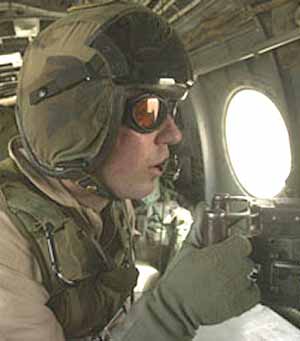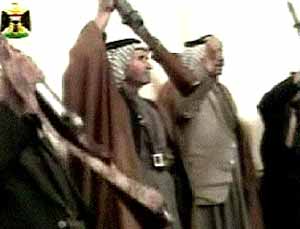
Marine Cpl. Phil
Sapio stands ready at a 50-caliber
machine gun while
transporting troops on a CH-46E
Sea Knight helicopter
into Iraq |
HILLA, Iraq
-- Coalition forces in the field have begun receiving a battle plan suggesting
the focus of the ground war in Iraq soon will shift to Baghdad, U.S. military
officials said Tuesday.
After days of intense
aerial bombardment, U.S. forces are in contact with Iraqi President Saddam
Hussein's "most prized forces" south of Baghdad, a U.S. Marine official
said.
Increasing numbers
of U.S. Army troops are being freed up for the siege on Baghdad, reports
CNN's Walter Rodgers, who is embedded with the 3rd Squadron, 7th Cavalry
of the 3rd Infantry Division.
Tough, ongoing battles
in southern Iraqi cities such as Basra, Najaf and Nasiriya could become
second priority as reinforcements come in and the military focus shifts
to Baghdad, Rodgers said.
"In our own terms
and in our own time, we'll continue the attack to defeat those fielded
forces," said Col. Tom Bright, Marine Corps chief at the U.S. Central Command's
joint operations center in Qatar, on CNN's "Larry King Live." |
| "Now the fight's
on to reduce those prize forces that [Saddam] has," Bright said.
These developments
come as the White House stepped up public efforts to downplay reports of
a rift between U.S. Defense Secretary Donald Rumsfeld and military commanders.
A senior administration official said that President Bush has "tremendous
faith" in Rumsfeld and the war plan.
"It's borne out by
what the president views as a successful military campaign," the official
said.
Coalition officials
have said their ground units had advanced within 50 miles south of the
Iraqi capital, where members of the elite Medina Division of Iraq's Republican
Guard have lined up near the central Iraqi city of Karbala. |
 Iraqi TV showed pictures
of clansmen who promised to fight to the last for Saddam Hussein
Iraqi TV showed pictures
of clansmen who promised to fight to the last for Saddam Hussein |
U.S. and British warplanes
and attack helicopters have pounded at these positions in recent days,
destroying half of the Medina Division's tanks, a U.S. military official
said, and setting the stage for a ground attack.
More than 3,000 precision-guided
munitions have been dropped in the last three days, bringing the total
to 8,000 since the U.S.-led military campaign began, the Pentagon said
Monday. Officials stressed that the bulk of these bombs targeted the Republican
Guard.
Additional elite
Iraqi forces are moving toward Karbala from the north, U.S. officials said,
while coalition reconnaissance units gather intelligence and engage in
sporadic skirmishes with Iraqi units.
There are maneuvers
under way "to try to destroy the divisions that stand in our way," said
Maj. Gen. Stanley McChrystal, vice director for operations of the Joint
Chiefs of Staff.
Other developments
• Coalition forces
have not found any evidence of weapons of mass destruction in Iraq, U.S.
Brig. Gen. Vincent Brooks said at Tuesday's Central Command briefing in
Qatar.
• In Kurd-dominated
northern Iraq, CNN's Brent Sadler reports Iraqi opposition forces took
a town that was a suspected stronghold of the Islamic militia Ansar al-Islam.
U.S. officials said the group is a link between Iraq and al Qaeda. Kurdish
fighters worked with U.S. Special Forces to destroy the operation. Equipment
and documentation indicating the presence of chemical or biological weapons
was found, according to Sadler.
• Iraq Information
Minister Mohammed Saeed al-Sahaf said Tuesday that a U.S. warplane struck
two buses in western Iraq filled with human shields. Al-Sahaf accused coalition
forces of "indiscriminately killing people." U.S. Central Command said
it is "not aware of any reports" of such a U.S. airstrike and is investigating
the allegation.
• A large explosion
produced plumes of smoke Tuesday evening (8:55 a.m. EST) in the southern
Iraqi city of Basra. British forces say they have secured the western part
of Iraq's second largest city, where Iraqi paramilitary forces have been
battling coalition troops for the past week.
• U.S. forces shot
and wounded a Kuwaiti Army soldier driving too close to a U.S. military
camp, a Kuwaiti Defense Ministry spokesman said. The soldier, who told
interrogators that he was taking a shortcut through the desert, was treated
for a shoulder wound and released by a U.S. medical unit at Camp Sanders.
• U.S. Secretary
of State Colin Powell is to leave Washington for Turkey on Tuesday, hoping
to mend fractured relations and discuss the war in Iraq. From Ankara, Powell
will travel to NATO headquarters in Brussels, Belgium.
• Two U.S. Navy pilots
survived a harrowing episode Tuesday in the Persian Gulf after their S-3B
Viking aircraft slid off the USS Constellation flight deck shortly after
touching down. The plane slipped left, hit safety netting and then plunged
into the water. The pilots ejected into the water, and swimmers from a
helicopter rescued them.
• Italian authorities
arrested two Kurds, an Egyptian and a Somali suspected of being affiliated
with Ansar al-Islam, the group in Kurd-dominated northern Iraq linked to
al Qaeda, said Italian police officials. The four men were detained Monday
as they were preparing to leave Italy for Iraq.
| • Fox News Channel
executives and the Pentagon reached a deal Monday in which correspondent
Geraldo Rivera, who raised the military's ire when he reported operational
details, will leave Iraq voluntarily rather than be expelled,
• Intense coalition
air raids subsided Tuesday in northern Iraq for the first time since hostilities
began, CNN's Ben Wedeman said. With this abatement, five Shiite recruits
from southern Iraq surrendered to coalition forces along the northern front.
One of the soldiers told CNN that Iraqi forces had "execution squads" to
kill any Iraqi deserters.
• British Foreign
Secretary Jack Straw on Tuesday praised journalists working in Iraq, while
warning against "snap judgments based on television pictures." Speaking
at Great Britain's Newspaper Society's annual conference in London, Straw
also outlined a plan to rebuild Iraq, saying that the United Nations would
play a major role in the nation's political and economic future.
|

A Kurdish militiaman
guards a checkpoint
in Kalak at the
dividing line between the
Kurd- and Iraq-controlled
parts of the country. |

|


